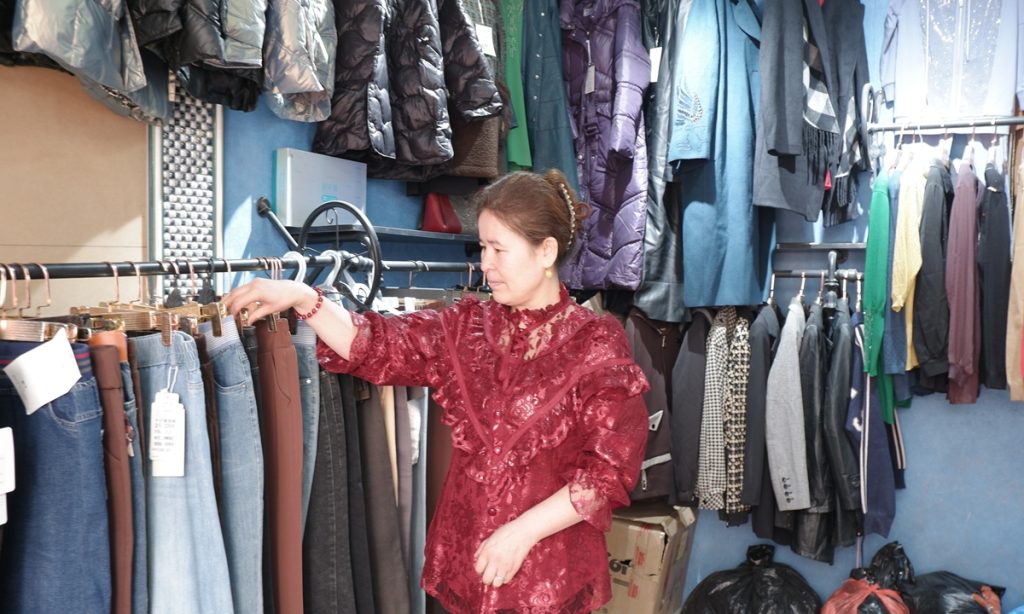GT on the spot: women in Xinjiang start up business for prosperous, happy life

To the south there lies the Kunlun Mountains, while to the north China's largest desert Taklamakan Desert -- this is the Hotan Prefecture where the mountainous area accounts for 33.3 percent while the Gobi desert makes up 63 percent. People have been clinging to small oases within these harsh environments. In the past, due to the harsh natural conditions, local women had limited employment options, with many being confined to farming or household chores. However, the situation has changed.
GT reporters again traveled to the region. In this third installment of a series of articles, GT tells character stories based on local women entrepreneurs in Hotan Prefecture, which effectively refuted vicious smears which attacked the employment and related human rights of local women by some anti-China forces, all of which were made up.
On Tuesday, the Global Times reporters visited the "Women's Entrepreneurship Street" in Pishan Farm, located in Hotan Prefecture. The shop owners there are all local women entrepreneurs. This street is home to 75 women-owned businesses, with clean and tidy shops and eye-catching pink walls.
There is a wide variety of shops, including tailors, stores, flower shops and snack shops. The Global Times reporter found many similarities among the rural women in the area -- they are exquisite and beauty-loving women, wives, mothers, entrepreneurs and the economic pillars of their families.
According to the local women's federation, in order to provide greater support for women's home-based entrepreneurship in the Pishan Farm and guide women to achieve independent entrepreneurship, an increase in income and create more job opportunities for ethnic minority women in their own communities, the women's federation allocated a special fund of 200,000 yuan ($28,000) in 2019 for home-based entrepreneurship. This fund was used to renovate the entrepreneurship street, which had been previously poorly equipped. Now, there are 75 women-owned shops on this street, providing employment and increased income for over 150 workers.
Buamyna Sadahmat, dressed in a red blouse adorned with layers of lace which she had made herself, is a renowned tailor.
Her tailor shop is the largest on the street, with a constant stream of workers coming to her for clothes. Not only has she become prosperous, but she has also hired several women to work in her shop, helping them solve their employment problems.
As the Global Times reporter arrived, Buamyna was busy in her shop. She is responsible for cutting, while her two apprentices are responsible for sewing.
Buamyna's husband works at a local public health station and their three children are all in school, so devotes most of her energy to the shop.
Because of her exquisite craftsmanship, her shop is highly favored by women in the surrounding area. Buamyna often studies clothing styles online and replicates them, making detailed improvements based on the needs of the customer. To attract more customers, she also started online sales and frequently livestreams to help customers choose clothes.
"Even though I have apprentices in the shop now, we are still a bit overwhelmed," said Buamyna.
Buaminai said her shop can achieve a monthly net profit of around 5,000 yuan. The busiest and most profitable time for her is during the Kurban Festival and Women's Day, when she can earn a net profit of 10,000 yuan in a month.
Since opening her shop, Buamyna has trained 95 apprentices, many of whom have opened their own shops. However, she confidently says, "I'm not afraid of competition because I have more experience, and I have the most returning customers."
Not far from Buamyna's tailor shop, a silk shop owned by Zuregul Azrant also attracted the attention of the Global Times reporter. Vibrant colors immediately catch people's eye, bringing joy to people.
This shop, which has been open for 18 years, is one of the two shops operated by Zuregul and her husband. They display various silk fabrics from Urumqi, Kashi Prefecture, and Hotan Prefecture, attracting women who love beauty to come and make purchases.
Zuregul also has three children, with the oldest being 13 years old. After the whole family finishes breakfast and the children go to school, she and her husband drive to the shop, preparing to open before 11 am.
"Our most popular product is the Atlas silk produced in Hotan. "Customers buy it to make clothes, and our ready-made formal dresses sell well too," Zuregul said, holding a piece of Atlas silk with her henna-dyed red nails. Famous for its rich and bright colors and distinctive changing zigzag patterns, Atlas silk, a national intangible cultural heritage, has been used by Uygurs for clothing and interior design for centuries.
Hotan women attach great importance to formal dresses, wearing them for weddings or parties. Some people only wear a formal dress once and then buy a new style for the next occasion.
Due to the locals' love for beauty, her business has always done well. This shop earns an annual net income of 50,000 yuan, and the other shop, which mainly sells home textile products, has recently opened and is also doing well.
Due to limited energy, the couple entrusted their farmland to relatives, with each person taking care of one shop. They have managed to make their businesses increasingly prosperous.
The Global Times learnt from the Pishan Farm that they used the special funds from the women's federation to re-pave the cement road, renovate the interior and exterior walls, create counters for supermarkets and cosmetics stores, install fitting rooms and cutting tables for each tailor shop, and improve relevant facilities. This beautification and lighting of the street not only enhances the happiness and sense of achievement of ethnic minority women in Pishan Farm, but also stimulates the enthusiasm of ethnic minority women for entrepreneurship and employment, expanding the channels for women's employment and increased income.